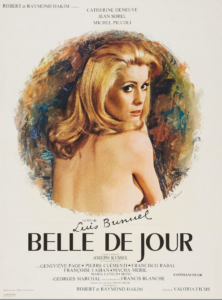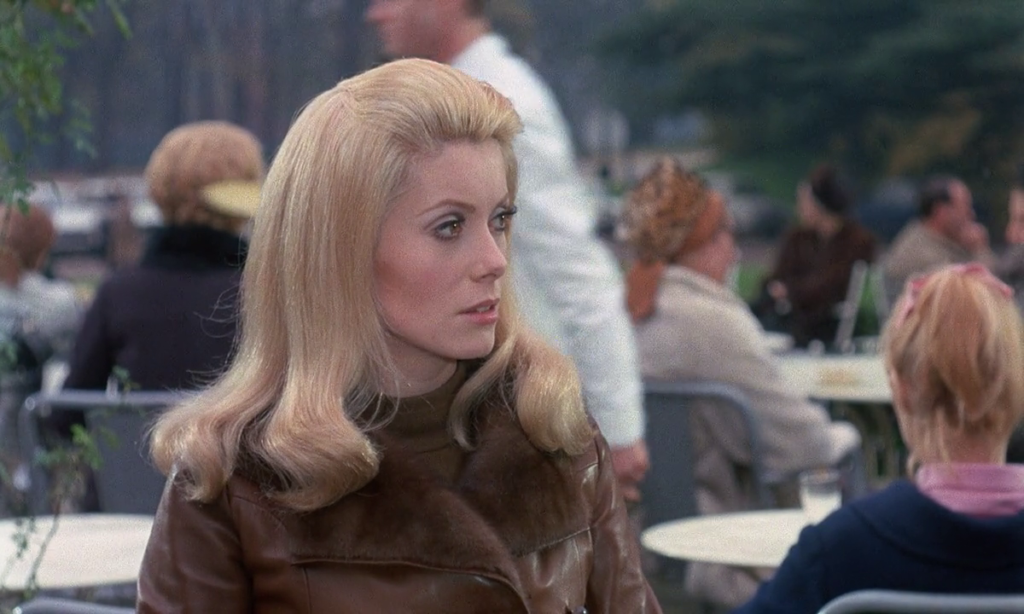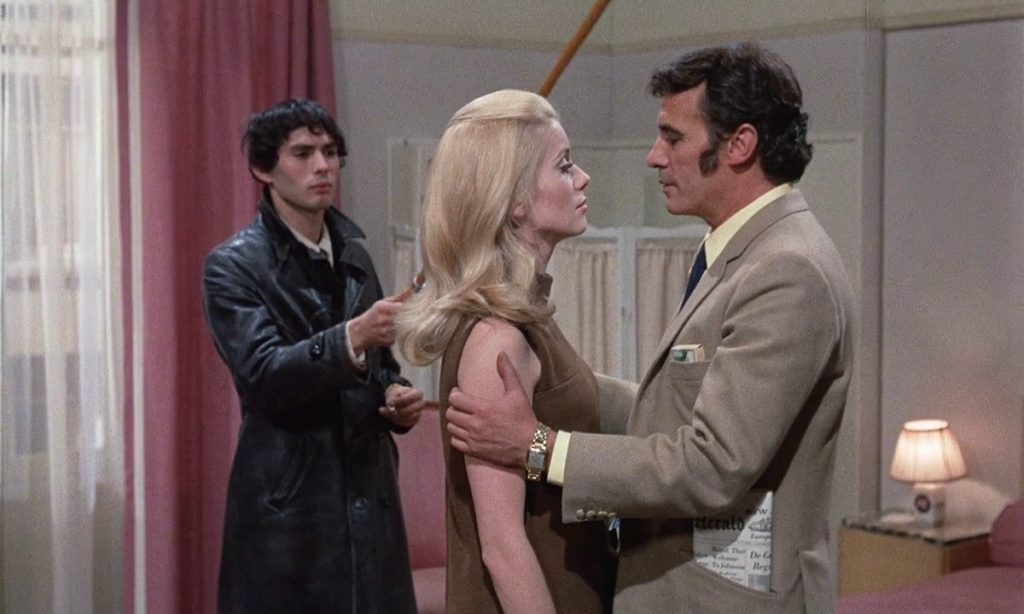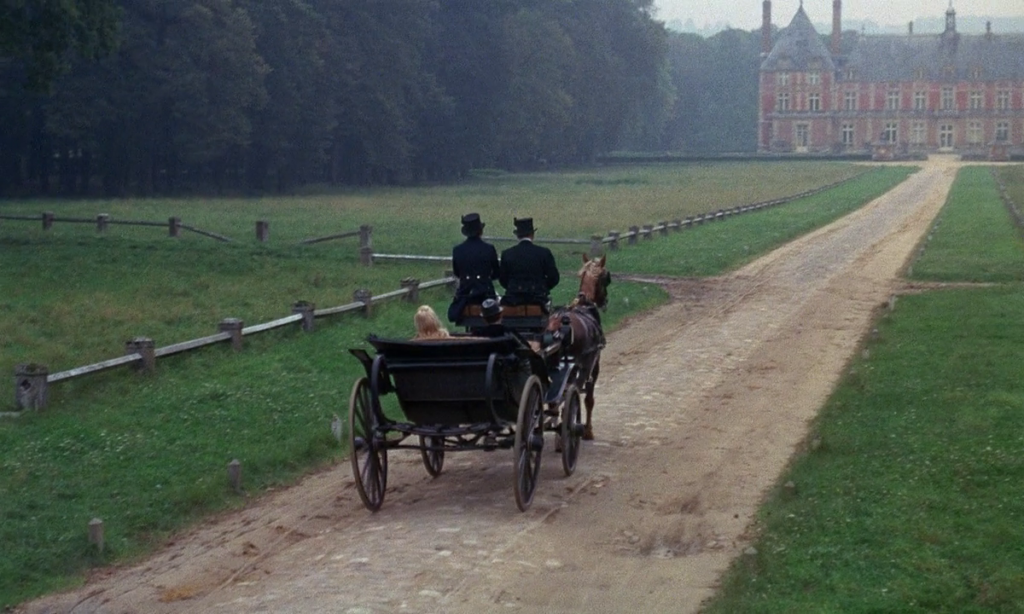|

Synopsis:
A frigid housewife (Catherine Deneuve) unable to make love with her caring husband (Jean Sorel) is intrigued to hear from an acquaintance (Michel Piccoli) that houses of prostitution still exist in Paris, and she secretly begins working for a madam (Genevieve Page) in the afternoons, participating in numerous odd fantasies — but when an edgy client (Pierre Clementi) falls for Deneuve and she’s equally attracted to him, she puts her private existence in danger.
|
|
Genres, Themes, Actors, and Directors:
- Catherine Deneuve Films
- French Films
- Housewives
- Infidelity
- Luis Bunuel Films
- Marital Problems
- Mistaken or Hidden Identities
- Newlyweds
- Prostitutes and Gigolos
- S&M
- Sexual Repression
- Surrealism
Response to Peary’s Review:
Peary writes that this “popular, controversial” film by Luis Bunuel is either — “depending on your viewpoint” — an “erotic or sexually reprehensible film.” He describes Deneuve’s character as feeling “no guilt for participating in sex” when she’s “at the brothel each afternoon”, becoming “part of the male clients’ weird fantasies” — and “it’s interesting that as she becomes more liberated through sex (breaking free of bourgeois shackles), she begins to reject the depraved, masochistic sex that characterized her early desires”, which is “a form of self-hatred” reflecting “her shame at having been molested as a child.” He continues his analysis by noting that “as her fantasies become more normal, at least as far as her role in them is concerned, [Deneuve] becomes ready to enter a normal sexual relationship with her husband” — but “he must be liberated as well, because guilt over his repressed sexual desires toward Deneuve cripple him, figuratively — and literally — speaking.”
Given that “in time we can’t distinguish between fantasy and reality,” Peary notes it’s possible that “the entire film, excluding the opening carriage ride and the final moment, might even be imagined by Deneuve,” which makes sense (though I’m not sure why he would exclude the “opening carriage ride” given its distressingly surreal outcome). Peary’s take on this enigmatic story — based on a 1928 novel by Joseph Kessel — makes just as much as sense as others that have been floated; Bunuel himself stated, “I myself cannot tell you what is real and what’s imaginary in the film. For me they form the same thing.” While it’s not a personal favorite, I admire the narrative risks taken, and believe all film fanatics should view this film at least once.
Redeeming Qualities and Moments:
- Catherine Deneuve as Severine

- Sacha Vierny’s fine cinematography


Must See?
Yes, as an enigmatic classic by a master director.
Categories
- Genuine Classic
- Important Director
(Listed in 1001 Movies You Must See Before You Die)
Links:
|




3 thoughts on “Belle de Jour (1967)”
Not must-see.
When I first saw this film – around age 20 or so – I saw it as ‘daring’ and ‘provocative’ and ‘challenging’. Having seeing it again now that I’m much older, I find it kind of dull and pointless. I’m not sure exactly what caused this shift in thought about it… except that it did seem dull and pointless.
Bunuel seems to rely a lot on the ‘shock value’ of Deneuve playing a bourgeois hooker… without giving us any real insight into her character. So she actually has very little to play and seems to have about zero depth as Séverine. As a result, the film just sort of plods along until it ends.
A film being “enigmatic” can be a very tricky thing. It means that the viewer must then supply meaning (personal or otherwise) for what the film itself only suggests or purposely leaves open-ended. That could work for this film – but perhaps my own inability in supplying ‘meaning’ just reflects the fact that I have next to no interest in the bourgeosie (i.e., the inner-conflicts of bored or repressed capitalists).
When I first began contributing posts to this site, I made a statement (I think) that every Bunuel film was probably a must-see. Certainly there are must-see Bunuel films but… I spoke too soon. 😉
What makes this intriguing to me (despite not planning to revisit it again) is the fact that Deneuve’s character is working out sexual molestation trauma in a manner that may be real, may be imagined, but ultimately allows her to feel like she’s taking back agency over what happens to her body and when. I like that feminist angle.
I’ve only ever seen part of this film many, many years ago (in the ’80s). I’d say this films critical reputation and historical significance ensures it remains a must see for FFs along with one or two other Bunuel films.